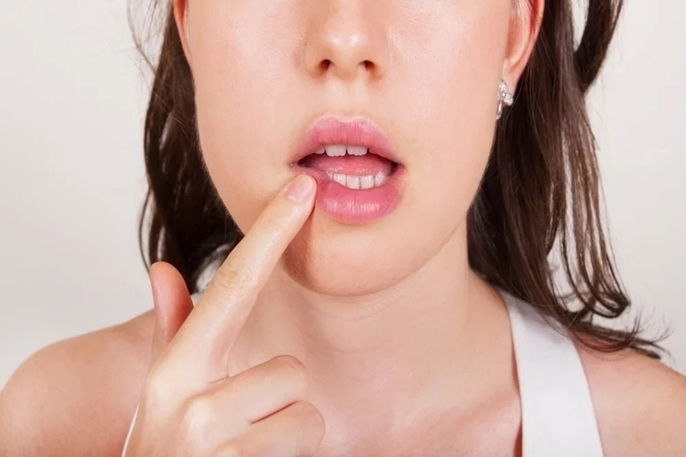Cold sores medicine aims to quickly reduce pain, discomfort and the risk of contaminating other people It can be applied as an ointment every 2 hours as soon as the symptoms of itching, pain or blisters begin to appear. In addition to ointments, there are also small patches that can cover the sores, preventing the spread of herpes and contamination to other people.
In the most serious cases, where the herpes takes more than 10 days to resolve, the doctor may also recommend the use of antiviral tablets to speed up treatment and prevent recurrences.
Cold sores are an infection caused by the Herpes simplex virus. They are not curable, and present during times of flare-ups. They are characterized by painful blisters around the mouth area that last around 7 to 10 days.

How cold sores are treated
Treatment for cold sores can be done with the following medicines:
1. Ointments
Treatment for cold sores can be prescribed by a general practitioner or pharmacist and is usually done with the use of ointments such as:
- Aciclovir, which is applied every 4 hours for about 7 days
- Silver sulfadiazine + cerium nitrate, which is applied about 3 times a day until the sores are completely healed. This is prescribed in cases of a higher risk for bacterial infections
- Penciclovir, which should be applied every 2 hours for about 4 days
During treatment, the patient must take every care not to contaminate anyone. They are advised to avoiding kissing others and to use their own linens, cutlery and glassware.
2. Cold sore patches
As an alternative to ointments, you can use a cold sore patch. These are applied directly over the lesion, and contribute to healing and relieve the pain caused by herpes. This adhesive also prevents contamination and the spread of the virus and is transparent, making it very discreet.
These can be applied and replaed 2 to 4 times per day.
3. Pills
Oral antivirals can be used in more serious cases and in immunocompromised people who run the risk of developing complications. They can also be used as a long-term treatment to prevent flare-ups, but only if recommended by a doctor.
The oral medications that are most prescribed to treat cold sores are aciclovir, valaciclocir and fanciclovir.
4. Home remedies
Home remedies can be used as a complement to the treatment prescribed by your doctor. A common remedy is eating one clove of raw garlic a day, which should be started at the first signs of herpes and maintained until it the lesion has fully cured. In addition to this, other home remedies prepared with paracress and lemon balm, which can also help to relieve symptoms and heal the lesions more quickly.
How to treat recurrent cold cores
In the cases of recurrent cold sores, which appear more than 5 times in the same year, you should adhere to the treatments indicated above at the first sign of symptoms to help reduce viral activity.
To prevent cold sores from appearing so frequently, you should:
- Avoid excessive stress and anxiety
- Moisturize your lips, especially when it's very cold
- Avoid prolonged exposure to the sun and apply sunscreen to your lips
Although cold sores disappear completely after treatment, they can reappear several times throughout lifespan. They particularly flare-up during periods of increased stress, after prolonged bouts of other illnesses, due to low immunity, or when the person is exposed to the sun for longer periods of time, such as on vacation.
Another way to reduce the frequency of cold sores is to take lysine supplements. You can take one or two 500 mg capsules per day for 3 months, or as advised by your dermatologist or pharmacist. The capsules should be taken when the herpes sores are getting better and will prevent them from reappearing, as well as reduce their intensity.
In addition, in some cases, the doctor may also recommend treatment with oral antivirals.
Treating cold sores during pregnancy
Cold sores treating during pregnancy or breastfeeding should be done with caution. Women are advised to discuss treatment options with their doctor to ensure the baby is not harmed. A good option is to use liquid dressings, which have no antivirals in their composition and are just as effective. Topical antiviral creams can also be taken as prescribed by the doctor.
Home remedies such as propolis also help the herpes sore to heal and relieve inflammation.
Signs of improvement appear around 4 days after starting treatment and include less itching, reduced redness and healing of the sores and blisters in the mouth. Signs of worsening cold sores are more frequent in patients who don't adhere to treatment properly and include the spread of cold sores to other areas of the lips or inside the mouth, as well as pain when chewing and swallowing.






























